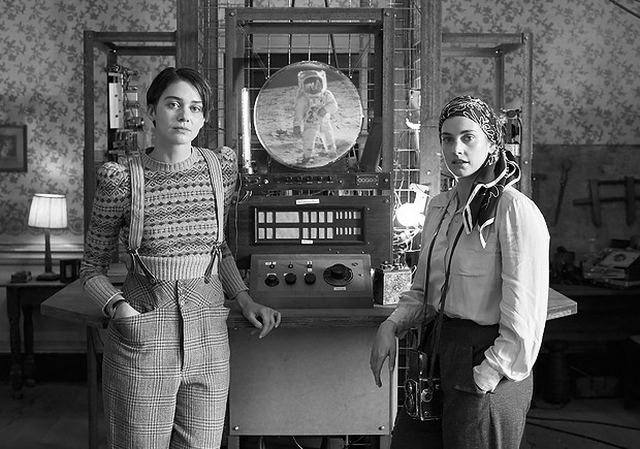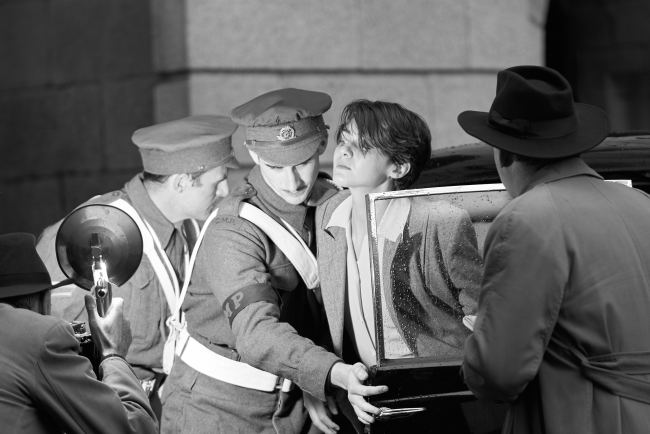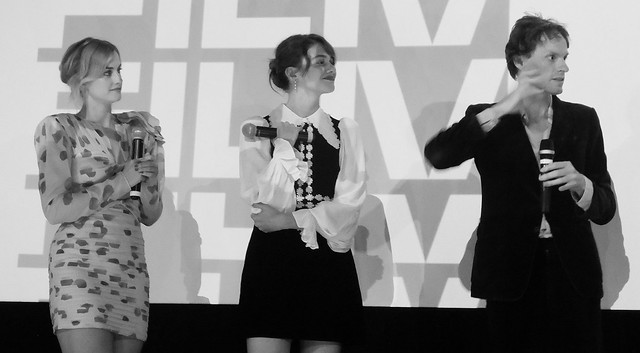EIFF 2022 Review: LOLA – “A clever piece of micro-film science fiction”
Directed by Andrew Legge
Starring Stefanie Martini, Emma Appleton, Rory Fleck Byrne, Aaron Monaghan
I had a good feeling when I first read about Andrew Legge’s debut feature in this year’s Edinburgh International Film Festival programme; when I get that buzz for a film or book I normally find my instincts were bang on, and I am glad to report that continues to be the case (thank you, intuition, you know what I will like!). Lola is the name of a special machine created and operated by two eccentric sisters, Thomasina (Emma Appleton) and Martha Hanbury (Stefanie Martini), a series of valves and tubes and wires that can tune into broadcasts from the future. The two have grown up isolated in a big, old country house in 1930s England, naming the machine after their late mother.
Once they confirm that the machine works by tuning into broadcasts in their near future and seeing if they then unfold as predicted, it starts off relatively light-hearted. The women use the machine to learn the winners in some upcoming horse races, making themselves a decent income to survive on, before going on to tune into a cultural smorgasbord of broadcasts from the future, especially music (Bowie, the Kinks and Dylan feature particularly). Thom is the more emotionally remote of the pair – she clearly adores her sister but has little time for anyone else, and if she has thought out some of the implications of her work, she isn’t sharing those concerns, nor does she plans to share the machine with the rest of the scientific world.
However, as the Nazi menace grows and war arrives, they both start to wonder if they shouldn’t be using their remarkable invention to help. Thom still doesn’t want to share her creation with anyone else, but she’s not against some form of aid, so they create a covert way of broadcasting warnings, using a clever system to make it almost impossible for the authorities to track their signal. In this way they can listen into news from a day or two in advance, then warn people in a certain area to take cover because an air raid will happen that evening without any warning. This soon earns them the nickname of the “Angel of Portobello”, and while most cheer these anonymous saviours (a newsreel shows and ARP Warden outside a shattered home, explaining his home was clobbered by German bombers, but thanks to the warning, his family was safe in the shelter), of course the authorities are keen to track them down and find out how they gather this intelligence.
The film is presented as a sort-of mix of found footage and documentary; it begins with the discovery of a pile of old film cans in an abandoned country mansion, all dated from the 1940s. It is through these that we discover the story of Lola – the sisters were determined to document their creation and the discoveries they make with it, but the films also include period newsreels (many doctored quite cleverly to include the cast or relevant events – shade of Forrest Gump). As the authorities finally become involved, the desperate nature of the Second World War demands that Lola be used to help a Britain with its back against the wall, and while this is perfectly understandable, anyone who has read a lot of science fiction will, as I did, already have an inkling that there will be repercussions to all of this – any change to the here and now (or the tomorrow morning) will ripple out into the future, the same future the sisters have been listening to, but will it be for good or ill? You’ll have to see the film to find that out.
While not without its flaws – for instance, faked newsreel footage of Lola and her use to fight the Nazis struck me as wrong, I’m sure in such a scenario it would have been as kept as tightly secret as the famous Bletchley Park), other historical what-if moments didn’t sit quite right with me (knowing a good bit of the period). But those are minor niggles and, to be fair, I can see why Legge chose to have them because they do work in the context of the narrative he is telling here. And besides, with any tale involving playing with time, arguments over those what-if moments and how they could have been or not is all a part of the fun, isn’t it? Fuel for a good post-movie chat in the pub afterwards.
As we go on we find there is a very good reason for the amount of the found footage, not just there because of documenting the creation of Lola, which I won’t go into, but I liked the idea and how it fitted into explaining some of the film. The main actors and director talked to the late-night festival audience, and some of the footage was shot on period cameras – those wonderful old clockwork-powered movie cameras – often in the hands of the actors themselves, with the cast and director also often developing those films, using slightly odd processes to ensure they looked damaged and dated, like they would if left in old film cans in an abandoned home for decades, and this compliments Oona Menges’s cinematography. As these reels were essentially documentary, the actors explained Legge had to keep telling them to ignore their acting training and dial down their performances to something more real-life, more documentary than narrative, and they both do this very well (with Martini and Appleton carrying the bulk of the screen time).
It’s a clever piece of micro-film science fiction using concept over the need for huge effects, a small and intimate cast but a huge central idea, the kind that can have you debating points of it for ages after watching the film. In many ways it reminded me of another time-travel, micro-budget movie I also saw at the EIFF many years ago, Primer, and I think Lola can hold her head up next to Primer, and I hope will garner itself a similar reputation and following.
Signature Entertainment presents LOLA exclusively in Cinemas 7th April.













